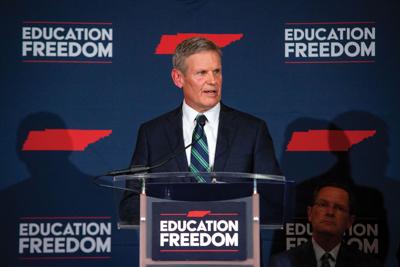
Gov. Bill Lee
Those tuned into Tennessee education have been embroiled in debate since Gov. Bill Lee announced his plan to push a statewide school voucher system in November.
As outlined in Lee’s announcement, the Education Freedom Scholarship Act would award 20,000 students with public money to use toward private education. Beginning in the 2024-25 school year, 10,000 “scholarships” will be reserved for students who are already eligible for vouchers, those with disabilities and those who are at or below 300 percent of the federal poverty level. The rest will be available to all other students. The program would then lead to total universal eligibility in following years.
The state already has a similar program that gives education savings accounts to more than 2,400 students at or below an income threshold in Davidson, Shelby and Hamilton counties. Families can put these ESAs toward private-school-related costs. The controversial legislation was passed in the state House by just one vote in 2019, but was tied up in court until 2022. Though the program was successfully expanded to include Hamilton County, an attempt to expand it to Knox County failed in the state Senate during last year’s legislative session.
Considering the ESA program’s short run and rocky start, it will be interesting to watch how Republicans react to a statewide voucher push — and whose positions have changed since 2019. House Speaker Cameron Sexton (R-Crossville) voted against ESAs in 2019, but has shown support for Lee’s statewide voucher program. Sexton told the Tennessee Lookout’s Sam Stockard that he views the ESA program and the the Education Freedom Scholarship Act differently because they would receive funding from different sources.
A statewide school voucher system has been widely criticized by urban and rural public education leaders alike. Proponents of expanded vouchers see it as an opportunity for more families to seek alternatives to traditional public schools. Critics argue that, in many cases, the proposed $7,075 per student is not enough to cover most private schools’ tuition and that vouchers drain much-needed funding from the public school system. (The Education Law Center ranks Tennessee 44th in per-pupil funding.)
Critics also decry the fact that vouchers enable public money to fund religious education, that private schools aren’t held to as many accountability standards as public schools, and that they can turn students away. Research about the effectiveness of vouchers varies — a November Tennessean article revealed high parent satisfaction rates for Tennessee’s ESA program, even as participating students performed worse than their public school peers on state tests.
“I think that the state should have waited at least, and been able to prove that [the ESA program] has been effective,” says JC Bowman, executive director of Professional Educators of Tennessee. “Now you’re getting into political season … where it’s gonna be a highly contentious area, and I think that nobody can predict what will happen.”
From housing and transportation to development of the East Bank, here are 11 stories to keep an eye on this year






